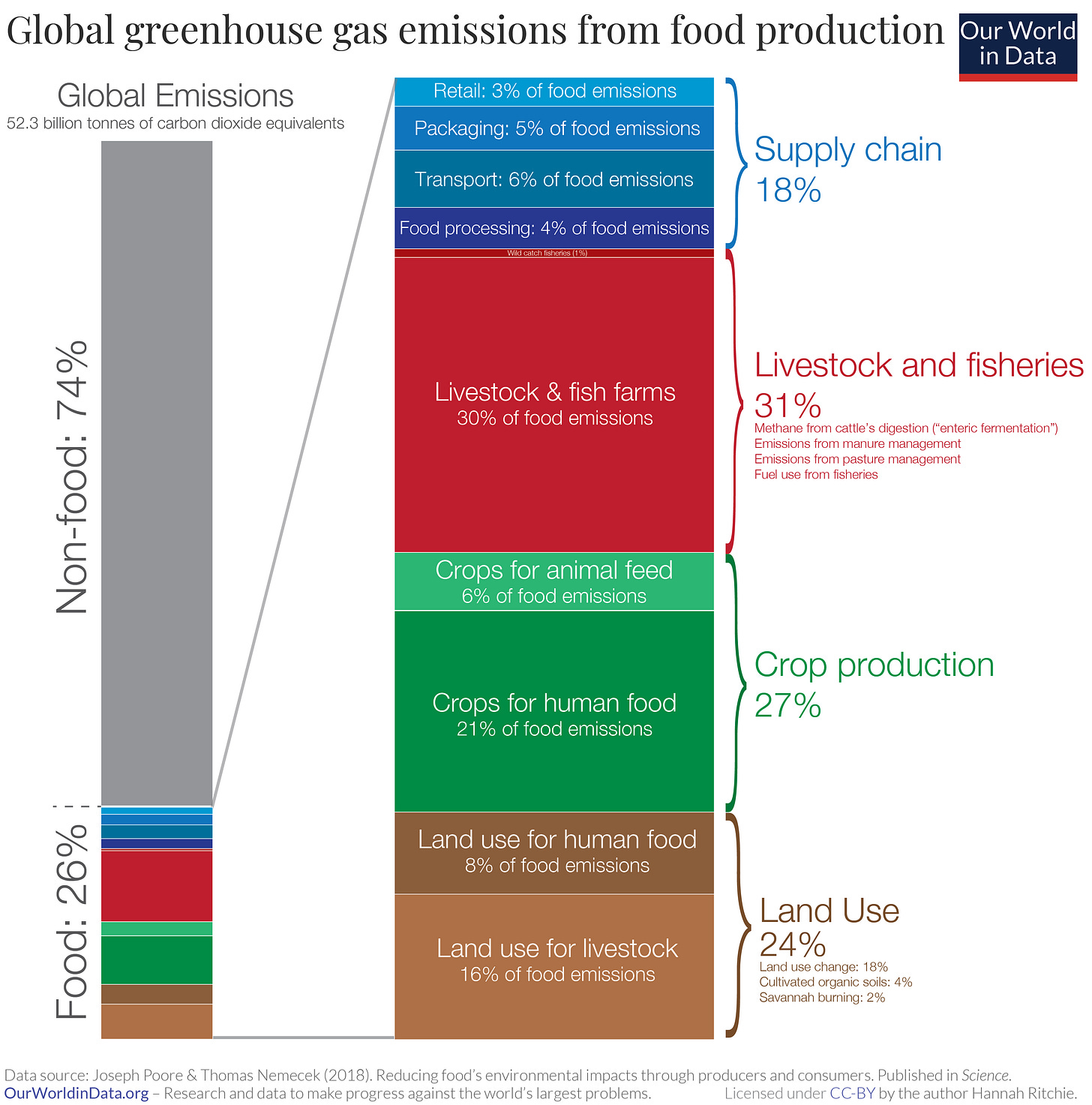Yes, you should still reduce your personal carbon footprint
We need to hold polluting companies accountable AND eat less meat. Both are also critical for curbing climate change.
I’m seeing a divide between the food-climate space and the broader climate movement that is beginning to really trouble me. Because there’s an urgent need for collective action to reign in polluting corporations, a growing number of climate experts seem to be saying, hey, stop worrying so much about your individual choices. Focus on the big picture instead.
Now, they have a point. I sometimes look at zero waste Instagram and wonder if 12 different ways to repurpose your empty dental floss package is really a thing we need to spend time on.
We can’t spend all of our time and energy on individual actions and let corporate polluters off the hook. But what this message gets wrong is just how important — critical, in fact — some individual actions are for slowing the effects of climate change. This is especially true in the food system space, yet emissions from agriculture continue to be downplayed or misrepresented, in part because emissions from other sectors have always been so much worse.
But in their urgency to generate much-needed collective action, some climate advocates may be inadvertently discouraging the kinds of behavioral change that we actually do need to be making.
This isn’t just my opinion. Studies show that eating less meat and wasting less food are two of the most powerful individual actions you can take to reduce climate emissions.
Yet in conversation after conversation, I find many climate advocates and climate journalists still believe that eating locally grown food is more important than eating less meat. Why is that? Because the transportation sector overall is a massive emissions source, it’s easy to assume the food system is the same. But it’s not the same at all. Transportation accounts for just 6 percent of overall food system emissions, because the system itself, including how we transport food across the country, is pretty darn efficient.
In fact, the main sources of food systems emissions are cattle belches, or enteric methane emissions, and land use, not transportation. You can address both just by cutting back on your meat intake, to around 1.5 burgers per week or less (try not to replace that with dairy). The other important action you can take is to cut your food waste with just a few changes like menu planning, ignoring sell-by dates (these aren’t true expiration dates) and being a bit more mindful about how much you buy at the store and order from a restaurant.
One way to begin connecting these individual actions to collective change is actually a pretty simple one: talk about it. And yet, at first, you may find these are challenging conversations to have, especially when it comes to meat. Food is personal. No one has deep attachments to their light bulbs or family traditions that center around water heaters. Yet start talking about even just the use of a gas cooktop and whoo boy, you will get some serious pushback. And that’s before we even get to what’s on the plate.
But if everyone who already makes these small shifts at home in turn talks to their friends and family about eating just a little bit less each week, perhaps that can begin to add up to meaningful change. It’s a start.
Hits and Misses: What I cooked for my non-vegan family this week
Hits: As usual, desserts are always a hit, including this vegan bundt that I’ve made twice now, subbing in a few geriatric bananas for vegan sour cream. My kids also love my focaccia (I use this Bon Appetit recipe but sub agave for honey and use plant-based butter). With it, I made sort of a chick’n parmesan sandwich of sorts with Gardein plant-based chicken strips, a quick tomato sauce with canned roasted tomatoes, garlic and a bit of plant-based butter (a vegan riff on Marcella Hazan’s classic) and Violife cheese shreds. Easy pasta night: semolina pappardelle with crispy mushrooms, a fancy mix fried up with lots of garlic in some olive oil.
Misses: I still can’t sell tempeh, including tempeh bacon, no matter how hard I try. But I keep trying! Because I really love tempeh! Alas. Anyway, also, my latest cookies were described as too crispy. This happened because I ran out of vegan butter and subbed in a bit of oil and then over-baked them. They ate them all anyway, I have to note.
Read It
My latest (and first story) for The Guardian:
America has a manure problem, and the miracle solution being touted isn’t all that it seems
Plant-based meat: Anticipating 2030 production requirements a new report from The Good Food Institute
US corn production is booming — but not for the reasons scientists hoped. A new study suggests climate, not genetic engineering, might have boosted recent productivity, and that makes some scientists nervous. National Geographic
Carbon offsetting is not warding off environmental collapse — it’s accelerating it. George Monbiot, The Guardian




